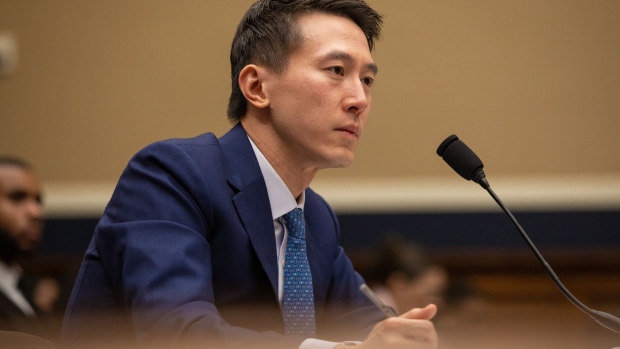Mar 23, 2023
TikTok CEO’s Careful Testimony Got Him No Closer to a Resolution
, Bloomberg News

(Bloomberg) -- TikTok CEO Shou Chew, confronted with an unforgiving, distrustful Congress, tried to give answers in his testimony Thursday that avoided offending either the US government or China.
But his evasiveness left Congress unsatisfied, with representatives hungrier than ever to punish TikTok for ties to its parent company ByteDance Ltd., based in Beijing. And he didn’t bring his company any closer to a resolution.
Politically, TikTok is now in a tougher spot. Its executives had been discussing divesting from ByteDance to resolve US national security concerns, people familiar with the matter told Bloomberg. But China this week said it would firmly oppose a forced sale.
Now the US has to decide whether to restrict TikTok, which would be politically unpopular, or accept TikTok’s promises that its US data is safely guarded and that its US users won’t be manipulated by the Chinese Communist Party — something many members of Congress have said they’ll have a hard time believing.
Chew didn’t say anything to alleviate concerns about sensitive TikTok data eventually reaching the Chinese government, according to Angelo Zino, senior equity analyst at CFRA Research. That could leave TikTok in limbo among the legislature — heavily criticized but not yet banned — and increase pressure on national security officials and the Biden Administration to come to a resolution.
Legislators and regulators have two main areas of concern, which were on display Thursday: whether TikTok’s ownership by a Chinese tech company presents national security risks and how users — especially young ones — could be influenced by the videos they see on the app.
Lawmakers have already introduced four bills that aim to ban the app over the national security risks posed by its Chinese ownership, one of which has support from the White House. The Biden administration is conducting its own review through the Committee on Foreign Investment in the US.
But there’s only a 35% to 45% chance a ban happens, Zino said, “with ’24 being an election year and politicians needing to tread carefully to ban a platform that is extremely popular.”
Chew fruitlessly tried to broaden the conversation to be about all social media companies — not just TikTok. He said that he supports comprehensive data legislation, saying that American social media companies “don’t have a great track record” on privacy and that dangerous content for kids is an industrywide issue.
But lawmakers weren’t buying Chew’s appeal. Georgia Representative Buddy Carter summed it up neatly when Chew invoked “industrywide” arguments: “We’re talking about TikTok,” Carter exclaimed, frustrated.
Chairwoman Cathy McMorris Rodgers didn’t allow Chew to respond to a number of critical monologues from lawmakers, at one point blocking him by saying, “TikTok’s time is up.”
When Chew did respond, he stopped short of giving lawmakers what they wanted: anti-China, pro-US reassurances. “You have absolutely tied yourself in knots to avoid criticizing the CCP” over the government’s oppression of the Uyghur minority in Western China, Representative Kelly Armstrong said.
Chew declined to answer questions about whether he supports the US First Amendment, repeating that he was in Congress to answer questions about TikTok. He said the app supports “free expression” and that it has committed to promoting free speech.
“Does TikTok support genocide?” asked Republican August Pfluger of Texas, referring again to the Uyghur minority.
“No,” Chew said.
Behind Chew in the audience for the hearing sat multiple TikTok influencers, supporting the app’s presence in the US because of how critical it has become for their lives and work. “I understand what the Congress people are arguing toward today, and certainly want to hear their perspectives and learn more about any potential dangers,” said Vitus Spehar, whose “UnderTheDeskNews” account has 3 million followers on TikTok. “But I think that my personal experience is, this is our community. This is where we’ve survived the pandemic together.”
Chew tried to use TikTok’s relevance for young people and small businesses in America as an argument for why the app should get congressional support.
Instead, “it actually strengthened US lawmakers’ argument that TikTok poses a threat to both national security and young people,” said Insider Intelligence principal analyst Jasmine Enberg. For TikTok, she said, the US is an incredibly lucrative market, putting billions of dollars at stake if the company’s work here is restricted. After the testimony, “TikTok’s fate in the US is on shakier ground than ever.”
©2023 Bloomberg L.P.





